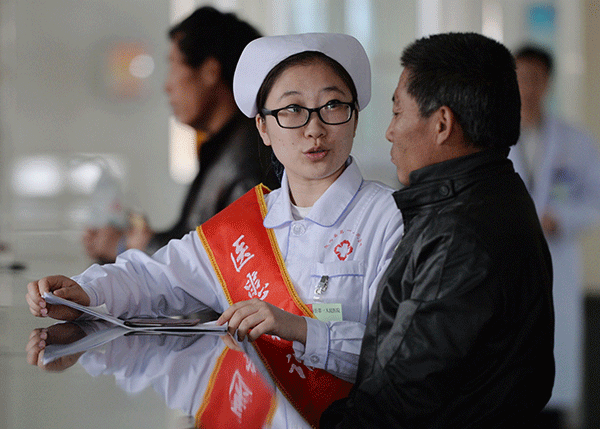Tread cautiously on retirees' medical insurance policy
Updated: 2016-01-04 07:45
(China Daily)
|
||||||||
 |
|
A nurse explains how to claim reimbursement from the national medical insurance program in Longxi County No 1 People's Hospital in Gansu province.[Photo/Xinhua] |
Retirees will possibly have to continue paying medical insurance. This is the message Minister of Finance Lou Jiwei gave in an article published at the end of 2015. It is both big and bad news for retired people who have long taken it for granted that they can enjoy their remaining years on regular pensions without paying any extra charges.
It will be very difficult for retirees to accept this policy, and they have reasons to believe that their living standards are being compromised by deducting a part, even if it's small, of their pensions for medical insurance.
Currently, after retirement civil servants as well as employees of State-owned enterprises and other institutions stop paying medical insurance. Given that they have worked for several decades and were underpaid during their younger days, they have been exempted from paying any extra fees or taxes and can enjoy their remaining years with the regular pensions they get.
The problem is that by the end of 2014 the number of senior citizens had reached 212 million, or more than 15 percent of the total population. And the reality is that the medical expenses of aged people are much higher than that of their younger counterparts who are still working and paying medical insurance. The rapid increase in the number of retired people will make it impossible for medical insurance accounts in various regions to meet their healthcare needs. Statistics show that medical insurance accounts in 225 regions are in the red by the end of 2013, accounting for 32 percent of the total.
By 2020, the number of people aged 60 or above will be 250 million, exerting even greater pressure on medical insurance funds. So the majority of citizens, especially retirees, may have to pay some medical insurance in the near future to enjoy better and cheap healthcare services. This could be one of the solutions to the medical insurance fund-shortage problem.
However, careful calculations must be made for people in different cities and even counties. In cities where the medical insurance accounts register a surplus, there is certainly no need for the retirees to continue paying medical insurance. In other words, the standards for such payments should be different for different circumstances in different regions.
And importantly, such payments should not be too high to harm the lifestyles of retired people.
- Workers eligible for double medical insurance
- Hopes for kidney transplants to be included in medical insurance
- Medical insurance merger approved for urban, rural equality
- Watchdog acts to prevent medical insurance leaks, manage costs
- Wider coverage for social medical insurance
- Medical insurance cover to be widened
- Top planner targets 40% cut in PM2.5 for Beijing-Tianjin-Hebei cluster
- Yearender: Predictions for 2016 through 20 questions
- Asia's largest underground railway station opens in Shenzhen
- Shanghai bans drug-using actors, drivers
- Clamping down to clean up the air
- Yearender: Ten most talked-about newsmakers in 2015
- Over 1 million refugees have fled to Europe by sea in 2015: UN
- Turbulence injures multiple Air Canada passengers, diverts flight
- NASA releases stunning images of our planet from space station
- US-led air strikes kill IS leaders linked to Paris attacks
- DPRK senior party official Kim Yang Gon killed in car accident
- Former Israeli PM Olmert's jail term cut, cleared of main charge

 127th Tournament of Rose Parade celebrated to embrace 2016
127th Tournament of Rose Parade celebrated to embrace 2016
 Yearender: China's proposals on world's biggest issues
Yearender: China's proposals on world's biggest issues
 NASA reveals entire alphabet but F in satellite images
NASA reveals entire alphabet but F in satellite images
 Yearender: Five major sporting rivalries during 2015
Yearender: Five major sporting rivalries during 2015
 China counts down to the New Year
China counts down to the New Year
 Asia's largest underground railway station opens in Shenzhen
Asia's largest underground railway station opens in Shenzhen
 Yearender: Predictions for 2016 through 20 questions
Yearender: Predictions for 2016 through 20 questions
 World's first high-speed train line circling an island opens in Hainan
World's first high-speed train line circling an island opens in Hainan
Most Viewed
Editor's Picks

|

|

|

|

|

|
Today's Top News
Shooting rampage at US social services agency leaves 14 dead
Chinese bargain hunters are changing the retail game
Chinese president arrives in Turkey for G20 summit
Islamic State claims responsibility for Paris attacks
Obama, Netanyahu at White House seek to mend US-Israel ties
China, not Canada, is top US trade partner
Tu first Chinese to win Nobel Prize in Medicine
Huntsman says Sino-US relationship needs common goals
US Weekly

|

|








